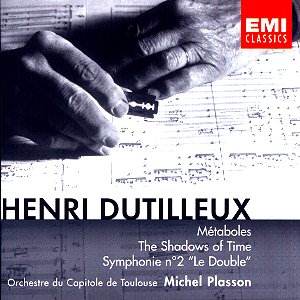This is a major release which only serves to reiterate
the stature of Henri Dutilleux. The credit is to be shared between the
Toulouse orchestra, who play with tremendous commitment, and the French
recording team, who provide such a clear recording of believable perspectives
and large dynamic range. Much care, not to mention gritty determination,
has gone into the preparation for this disc. Only the rather clumsy
English translation of Myriam Soumagnac’s notes could potentially put
anybody off this issue. Indeed, these are performances to return to
time and time again: the more one listens, the more there is to discover.
Dutilleux, in his handling of the orchestra, is essentially
a French colourist. The parallel instrumental lines of ‘Incantatoire’
(the first of Métabole’s five movements) point to Messiaen,
but there is a distinctly Stravinskian flavour there also. Intriguingly,
in a short preface to this recording by the composer himself, Dutilleux
refers to the ‘steel blue’ of the woodwind section of the original dedicatees,
the Cleveland Orchestra: clearly both Messiaen and Dutilleux share colour-sensitivities
that consistently enrich their tonal palette. Debussy unsurprisingly
is present also (try the shifting instrumentation and glissando strings
of ‘Vagues de lumière’ from The Shadows of Time).
Métaboles of 1964 is a major, kaleidoscopic
achievement, taking in a wide variety of emotions from the delicate,
shady opening of the fourth movement (‘Torpide’) to the sheer demands
on the concentration of the third (‘Obsessionel’). The jazzy rhythmic
undercurrent of ‘Obsessionel’ is more fully exposed in the final movement,
marked ‘Flamboyant’. This it certainly is, positively bursting at the
seams with vitality.
Alternative versions of Métaboles exist
primarily from Yan-Pascal Tortelier (Chandos CHAN9565), Rostropovich
on Erato and Chung on DG with the Paris Bastille Orchestra, where the
piece makes an intriguing coupling with Berlioz’ Symphonie fantastique
(DG 445 878-2).
The Second Symphony was written to celebrate the seventy-fifth
anniversary of the Boston Symphony Orchestra, and was premiered by that
orchestra under Charles Munch in December 1959. Perhaps what impresses
most about Dutilleux’s writing is that no matter how complex it gets
(and the final movement certainly has its challenges), the musical logic
is always clear and followable. Credit should also go to Plasson’s deep
understanding of Dutilleux’s voice and aesthetic in this respect. Only
the Hollywood-like opening of the final movement surprises. The later
return to Stravinskian sonorities comes as something of a relief; the
hypnotic close is fully satisfying.
The Shadows of Time represents a shift to 1997.
Debussy again hovers over the first movement, Les Heures (now
with a Lutoslawskian flavour, though: Chain I seems to be in
the background somewhere). But the whole is essentially from Dutilleux
himself. The concept of time exerts an eternal fascination for artists,
and Dutilleux is no exception. His ruminations on this theme (the subtitle
is ‘Five Episodes for Orchestra with Children’s Voices’) do indeed seem
to represent some of his finest music, the three child soloists appearing
as voices of innocence in an eternally complex whole.
Dutilleux’s music can be fascinatingly gestural, but
always this facet is held under a firm structural umbrella. The fine
cohesive forces and undeniable emotive power of these pieces should
surely serve to guarantee them a lasting place in the repertoire.
Colin Clarke


